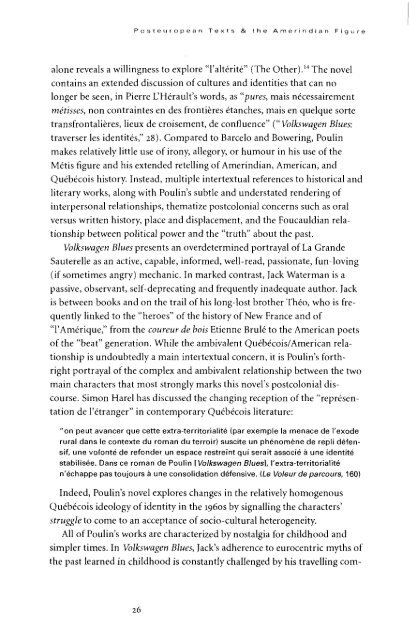The Carpathians - University of British Columbia
The Carpathians - University of British Columbia
The Carpathians - University of British Columbia
Create successful ePaper yourself
Turn your PDF publications into a flip-book with our unique Google optimized e-Paper software.
alone reveals a willingness to explore "l'altérité" (<strong>The</strong> Other). 14 <strong>The</strong> novel<br />
contains an extended discussion <strong>of</strong> cultures and identities that can no<br />
longer be seen, in Pierre L'Hérault's words, as "pures, mais nécessairement<br />
métisses, non contraintes en des frontières étanches, mais en quelque sorte<br />
transfrontalières, lieux de croisement, de confluence" ("Volkswagen Blues:<br />
traverser les identités," 28). Compared to Barcelo and Bowering, Poulin<br />
makes relatively little use <strong>of</strong> irony, allegory, or humour in his use <strong>of</strong> the<br />
Métis figure and his extended retelling <strong>of</strong> Amerindian, American, and<br />
Québécois history. Instead, multiple intertextual references to historical and<br />
literary works, along with Poulin's subtle and understated rendering <strong>of</strong><br />
interpersonal relationships, thematize postcolonial concerns such as oral<br />
versus written history, place and displacement, and the Foucauldian relationship<br />
between political power and the "truth" about the past.<br />
Volkswagen Blues presents an overdetermined portrayal <strong>of</strong> La Grande<br />
Sauterelle as an active, capable, informed, well-read, passionate, fun-loving<br />
(if sometimes angry) mechanic. In marked contrast, Jack Waterman is a<br />
passive, observant, self-deprecating and frequently inadequate author. Jack<br />
is between books and on the trail <strong>of</strong> his long-lost brother Théo, who is frequently<br />
linked to the "heroes" <strong>of</strong> the history <strong>of</strong> New France and <strong>of</strong><br />
"l'Amérique," from the coureur de bois Etienne Brûlé to the American poets<br />
<strong>of</strong> the "beat" generation. While the ambivalent Québécois/American relationship<br />
is undoubtedly a main intertextual concern, it is Poulin's forthright<br />
portrayal <strong>of</strong> the complex and ambivalent relationship between the two<br />
main characters that most strongly marks this novel's postcolonial discourse.<br />
Simon Harel has discussed the changing reception <strong>of</strong> the "representation<br />
de l'étranger" in contemporary Québécois literature:<br />
"on peut avancer que cette extra-territorialité (par exemple la menace de l'exode<br />
rural dans le contexte du roman du terroir) suscite un phénomène de repli défensif,<br />
une volonté de refonder un espace restreint qui serait associé à une identité<br />
stabilisée. Dans ce roman de Poulin [ Volkswagen Blues], l'extra-territorialité<br />
n'échappe pas toujours à une consolidation défensive. (Le Voleur de parcours, 160)<br />
Indeed, Poulin's novel explores changes in the relatively homogenous<br />
Québécois ideology <strong>of</strong> identity in the 1960s by signalling the characters'<br />
struggle to come to an acceptance <strong>of</strong> socio-cultural heterogeneity.<br />
All <strong>of</strong> Poulin's works are characterized by nostalgia for childhood and<br />
simpler times. In Volkswagen Blues, Jack's adherence to eurocentric myths <strong>of</strong><br />
the past learned in childhood is constantly challenged by his travelling com-

















